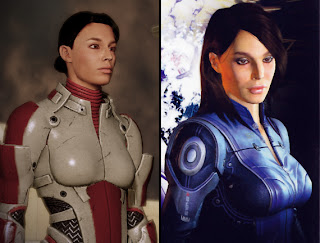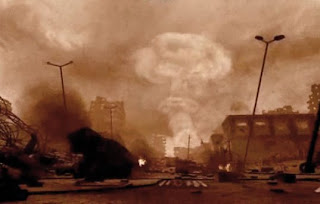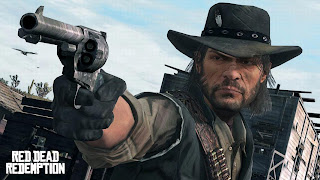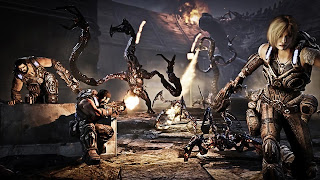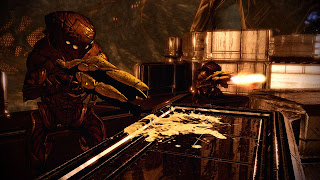After sitting through the excellent intro video that many people have already seen, I got presented with a server list... all of which were full. Picking one with the lowest wait time on the West Coast of the US, I did a few things while waiting to get a slot. Within a few minutes, I was logged on and ready to pick a side. After picking the Galactic Republic, I was treated to the "Hope" trailer before I got to select my class. Now, maybe it's just me, but I would have thought that anyone who is keen enough to participate in a beta will probably have already watched these videos, and even if they haven't they add little enough to the actual story of the game as it's presented to the player for them to actually matter. I might be nitpicking here over some nice eye candy, but as far as I was concerned, I didn't need to waste my time and download bandwidth on those videos.
Regardless, I fired up the character creator and got to select my class (Jedi Consular), race (Miralukan - like Visas Marr), and then the usual character appearance customisation. This defined body & face shape, skin tone, hair style/color, scars and my "mask" (seeing as Miralukans are physically blind). Unlike many MMOs it actually appeared as though this appearance would help individualise the character, as I didn't see anything items that I'd be wearing over my head or obscuring those choices completely. Now, of course, there is the potential that people will create identical looking characters, but there seemed to be enough variation that you wouldn't have everyone looking the same. With my character created, I was treated to the classic Star Wars rolling text over space before being presented with a cutscene of my character turning up on a Jedi homeworld.
In retrospect, I feel like I made a Jedi Guybrush Threepwood
First, let's talk about the visuals. It's not a mindbogglingly gorgeous game, and there were some texture issues like texture pop in dialogue/gameplay and generally low texture resolution. That said, it still looks okay, though I wouldn't be surprised if there are some improvements before the final release. The art design is clean and simple, going for a stylised appearance. To be honest, that's what I've come to expect of an MMO. Having to deal with high resolution graphics along with the overhead of an MMO is something that modern computers can do, but an MMO has to market to as many people as possible and targeting the enthusiast PC market doesn't mesh with that aim. I didn't really have any "wow, that looks awesome" moments in terms of scenery, but to be honest I don't think I've ever got that within the first four hours of an MMO.
On the plus side, the character animations are quite smooth, and it imparts some of the "yeah, I'm a real hero" feeling that is sometimes lacking from the regular "I throw a fireball", "I shoot a gun", "I hit the enemy with my fists" that feels flat and lifeless. It's no Ninja Gaiden or God of War, but it does feel a little more potent than contemporary MMOs. This is a little bit offset by the fact that it feels somewhat slow when you run, and the silly looking jump animation that looks like it's pulled straight from WoW. That said, my Jedi did do a nice looking tumble roll when he fell from a significant height, which was a very nice touch.
It's an MMO. Don't expect Crysis 2 tech here.
In general story-telling and quest flow, you can feel the "BioWare formula" coming through. It feels like a BioWare game, with the dialogue wheel, characters building you along the way, and leading you along the "individual journey" that their games typically manage well. This does come across a little strange I had people telling me "you're the most talented person we've seen in years" only to see other Jedi Consulars running along the exact same paths as me... this did shatter the illusion of my character being "special" as I was being told, knowing that all these other players were being given the same speech. Perhaps this problem was exacerbated by having so many beginners at the same time, but it felt as though it weakened the narrative a little. The writing still seemed quite reasonable, though I confess that once again I was put off the Jedi order by a "love is evil and leads to the dark side" sidequest.
That said, the voice acting is very good across the board, though I really do wonder how necessary it is. Some players were commenting how it drew them into the game a lot more and that they actually paid attention to the story, which is obviously what the designers were aiming for. I lost count of the number of times I was in a group in other MMOs were quest dialogue/overviews were skipped, and eventually I began ignoring them myself because trying to follow the story was already a lost cause. I briefly got to play in a group, which was a really nice touch, as each player got to say lines of dialogue (though I wasn't clear on how the game chose WHO would speak) within the conversation. This actually really made it feel like you were in a party and pushed that social aspect forward. The NPCs also emote and have the facial expression variance that has become a staple of BioWare's titles. While they're talking to you, the characters do a good job as virtual actors.
She looked and sounded concerned
Now the big one: gameplay. Well... it's an MMO. If you hate MMOs, this probably isn't going to change your mind. Combat is not automatic - if you want to attack, you have to push a button and keep pushing them until your enemy is dead. Living in Australia, I thought this might be somewhat problematic given a beta stress test weekend and having to connect to a server on the US West coast. I was pleasantly surprised to find that lag was not a significant issue at all, and that I could quite comfortably manage to play with only a couple of lag spikes. I seemed to be getting better performance than some other US players. To start with it felt like the standard "mash button until enemy is dead" gameplay of MMOs, but I did pick up a few abilities near the end to perform stun and lift (crowd control), so it did seem as though the variety of skills and tactics to use would increase as I increased in level. There was a sense of "I've been here before" that I couldn't quite shake, but it seems like the so called "advanced classes" will allow players to pick different roles (tank, healer, support, DPS) based on what is necessary for the group they're travelling with. It's hard to tell whether this will lead to people trying to be a jack-of-all-trades or pursuing particular specialised roles as characters reach higher levels.
The usual MMO problem of backtracking is no less present in TOR than any other MMO, although they have tried to lessen the impact through liberal use of "quick transport" options - speeders that will get you from one location to another for a minimal fee. This does help alleviate the dull "run back to the quest giver" chore that plagues many MMOs, but without removing it entirely. Creatures spawn regularly and populate the map in large numbers, but in some cases it is possible to pass them by without fighting if you're just trying to do a return run. Side quests also become available when you're about to head to a new area for your class "main quest", meaning that you easily polish off a few quests in one trip, making it feel more productive and heroic. Additionally, the classic grind quests of "kill 65,340,285 boars" are mostly relegated to "additional objectives" as part of other quests. This is a nice touch in that the grind feels as though it's optional, and for the most part you'll likely end up killing the required number of creatures as a matter of course in trying to achieve the core objective of the quest.
After adventuring in those mountains, I go to turn in three quests at once
As an overall experience, it seemed reasonably fun, though I do feel as though it would have been far more enjoyable with a group. It really did seem as though group play would feel a lot more rewarding, and going solo somehow made it feel as though you were missing out. I'd be interested to see how different the experience is in that case. The other issue is the concept of choice and the light-side/dark-side within the game. I didn't see any real consequences as a result of previous choices I'd made in my brief journey, but I'm not sure that I can necessarily expect that in such a short time frame. The light side points I kept gaining (yeah, yeah, I was playing a goody-two-shoes, deal with it) didn't really seem to have any great benefit. I was told by the in-game help that certain items would require me to have a certain level of light side points in order to equip, but if that's as far as the system goes, then it feels a little... "gamey".
So, Star Wars: The Old Republic - it's an MMORPG in the Star Wars universe with an increased focus on story. It had a feel similar to the Knights of the Old Republic games, and that's by no means a bad thing. How it will translate into a fully-fledged release will be interesting to watch, but it is definitely an MMO to keep your eye on.












